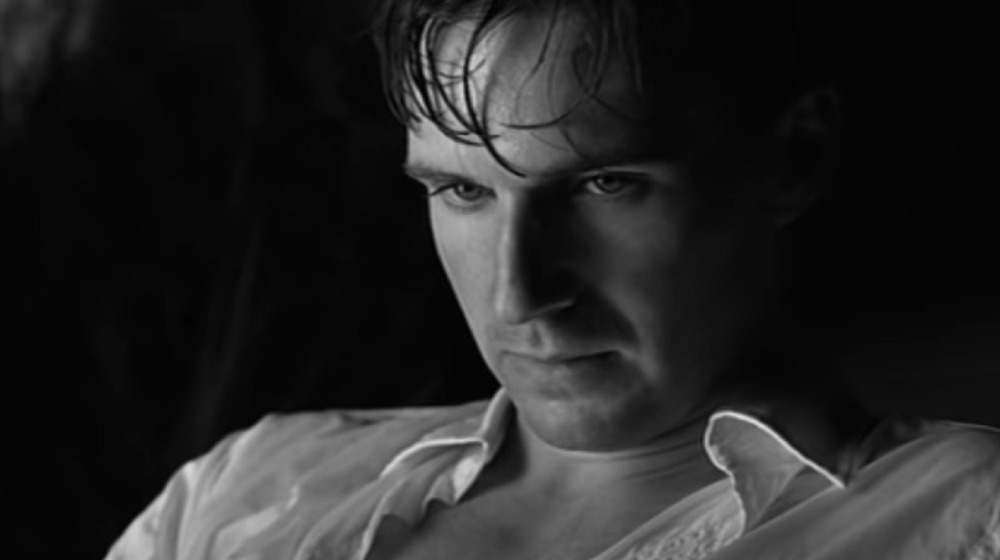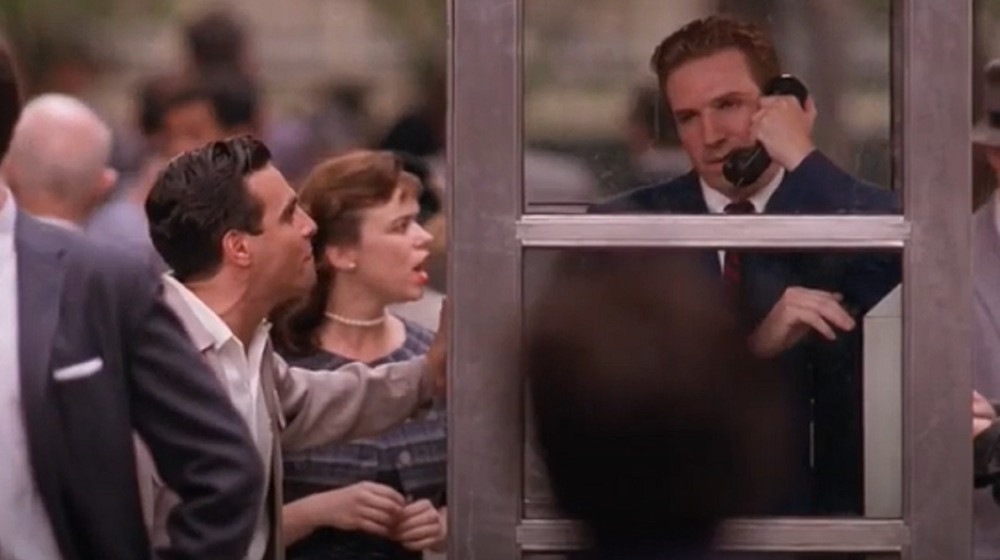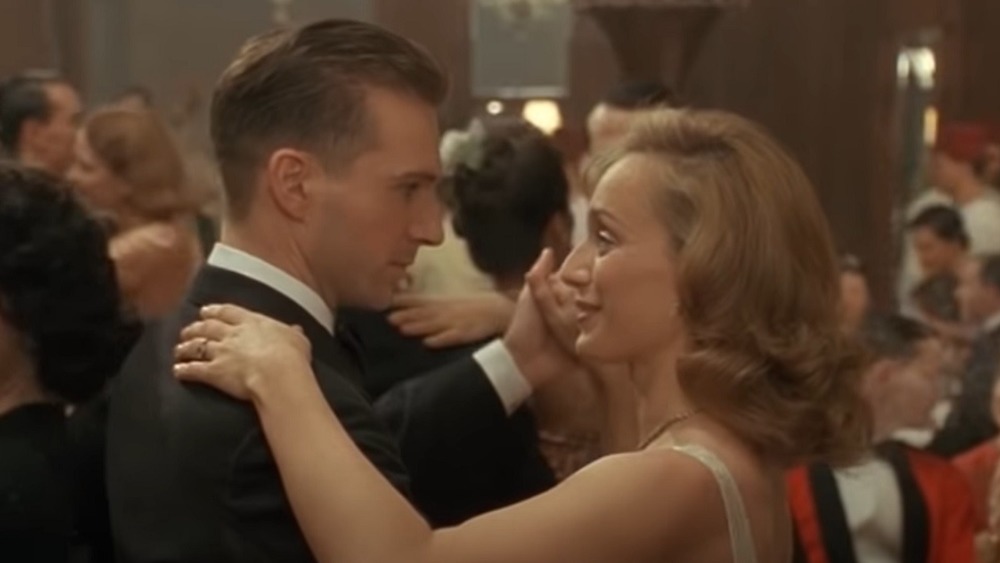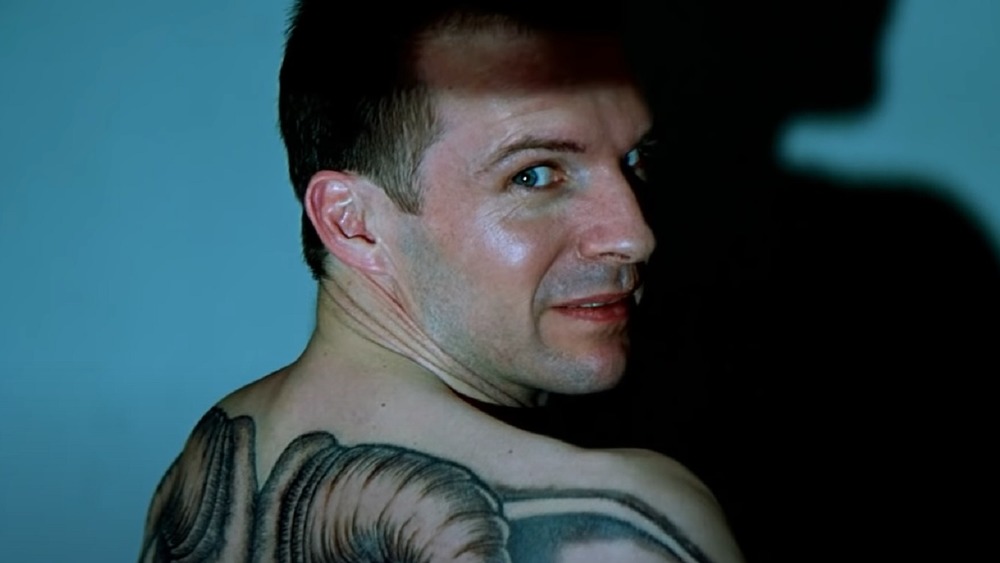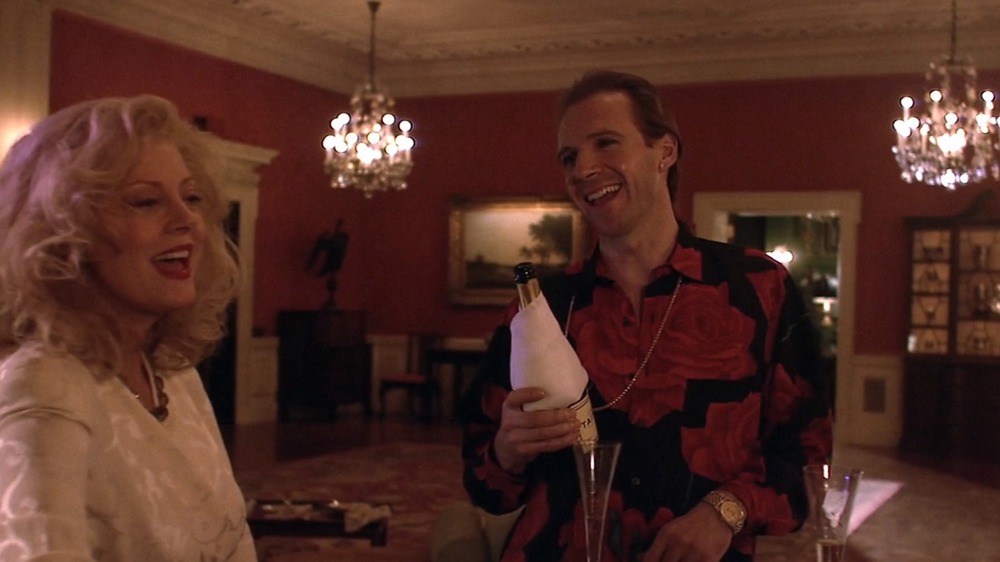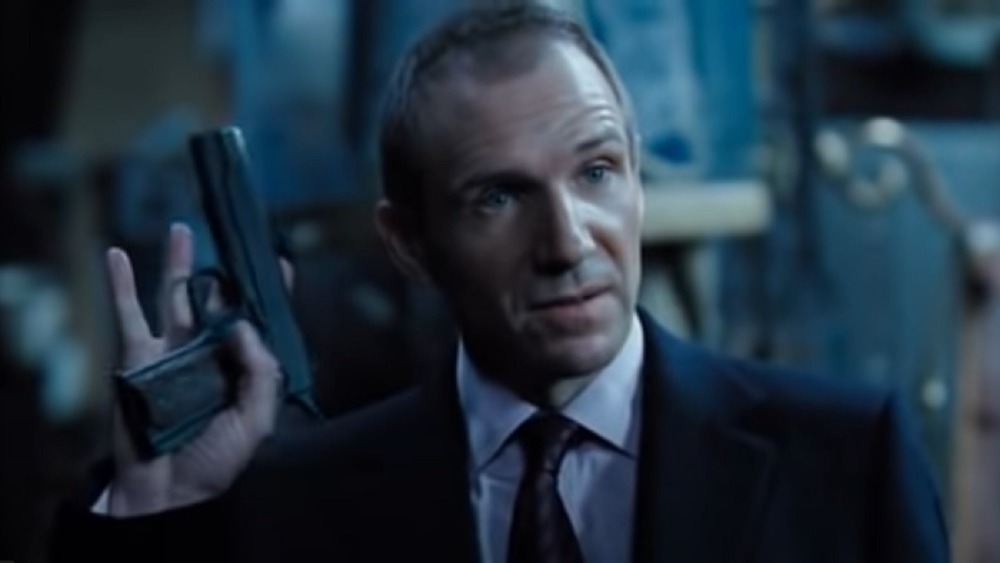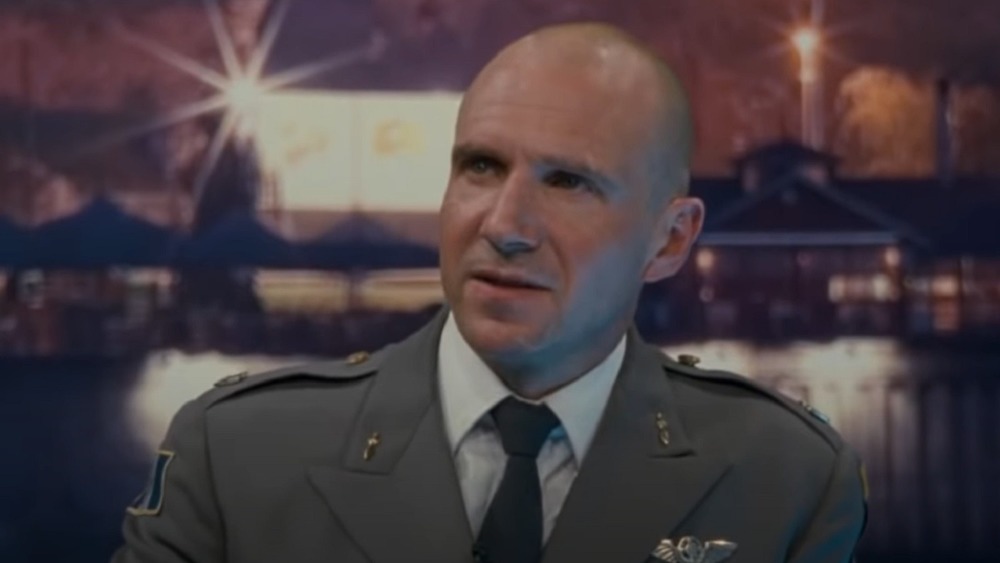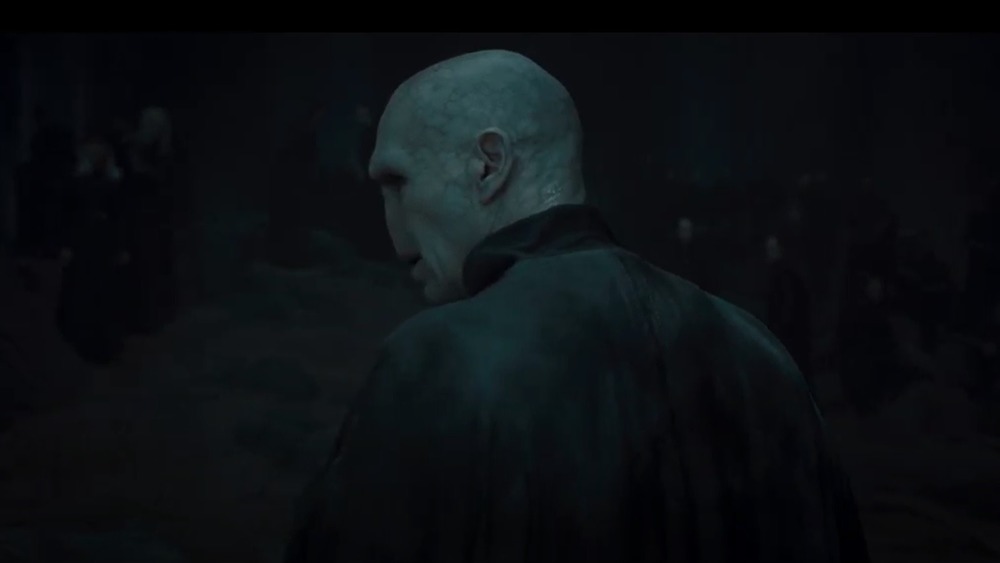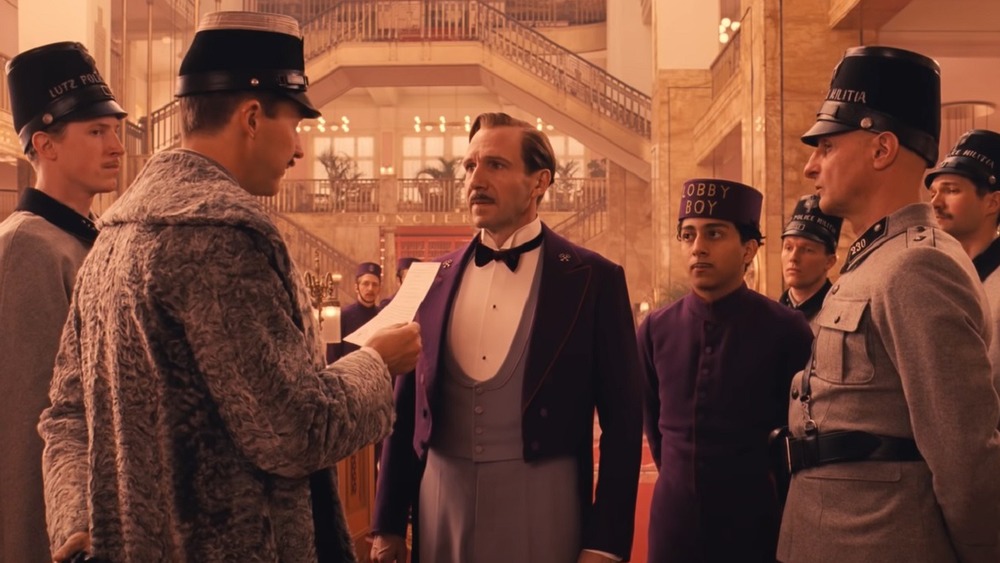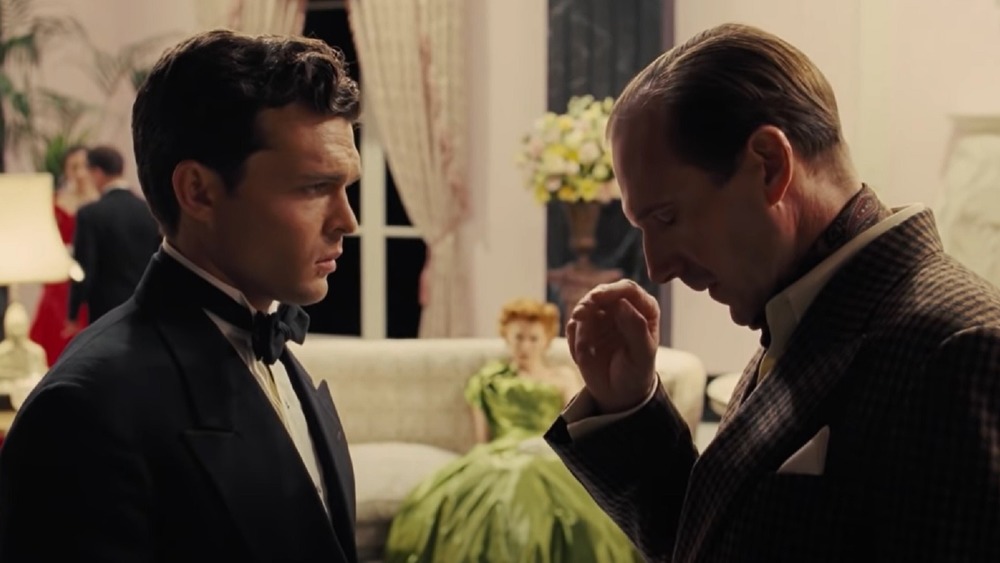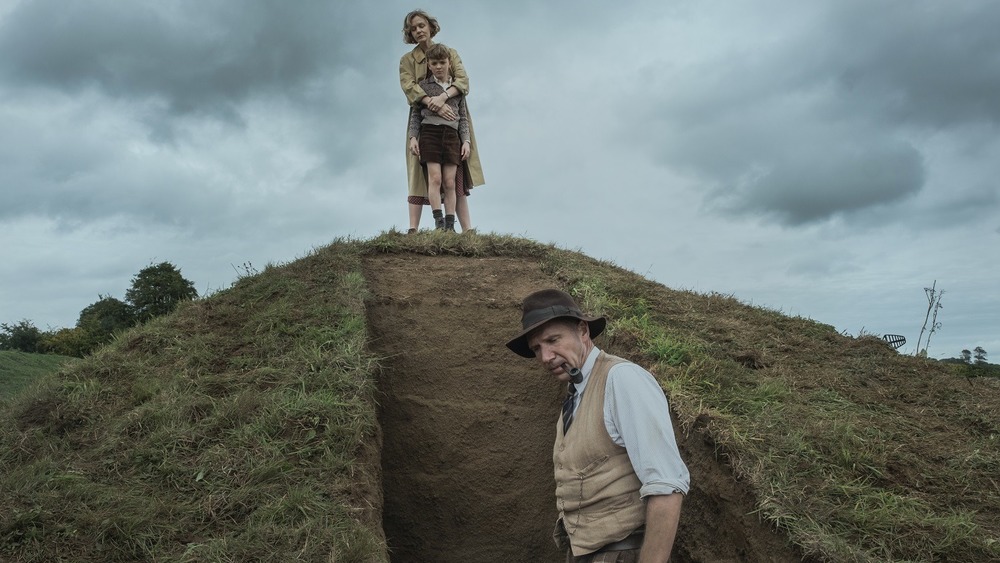Ralph Fiennes' Most Iconic Scenes
This content was paid for by Netflix and created by Looper.
Few actors have enjoyed as much critical and box office success as Ralph Fiennes. The thespian first made a name for himself while performing with the Royal Shakespeare Company in England, and he's maintained an air of esteem and authenticity ever since he took his talents to the silver screen. Fiennes has become known for his compelling work in many prestige and period dramas, and he has also impressed in some key comedies, horror movies, and he has also been the leading man in several unforgettable romances.
Fiennes can now be seen in Netflix's The Dig, which tells the incredible true story of the 1939 excavation of the Sutton Hoo site in Suffolk, England that changed our understanding of history forevermore. In the film, Fiennes portrays the reserved digger who first uncovers the truth of the site, and the movie is yet another example of how much power he can pack into his performances. To celebrate Fiennes' newest work, here's a look back at some of his most iconic film scenes of all time.
Schindler's List - "Control is power"
Ralph Fiennes made his movie debut as Heathcliff in the 1992 adaptation of Wuthering Heights, and he also appeared in the 1993 drama The Baby of Mâcon. But it was his work in Steven Spielberg's Schindler's List that really put the actor on the map. The film adapts the true story of Oskar Schindler (portrayed by Liam Neeson), a German industrialist who saved the lives of 1,200 Jewish people in Poland during World War II by bribing Nazi officers to send them to his munitions factory. Fiennes stars in the film as the heinous SS officer Amon Göth, who oversees the Kraków-Płaszów concentration camp and whose violence against Jewish citizens inspires Schindler to begin his rescue efforts.
Fiennes' portrayal of the brutal officer produces several searing scenes, including one in which he discusses the true nature of power. Göth believes that "control is power," while Schindler contends that mercy is actually the ultimate display of strength. Göth considers that to be a joke and makes light of his own brutality. Fiennes revealed to journalist Bob Woodward that in approaching this role, he set out to showcase the "banality" and "everydayness" of evil that the real-life version of his character and so many others like him represented, and this scene is certainly an example of that. Fiennes' chilling performance earned him a BAFTA win for Best Supporting Actor, and he was also nominated at the Academy Awards and Golden Globes for the role.
Quiz Show - "That is not me"
The 1994 game show drama Quiz Show features Ralph Fiennes as Charles van Doren, a contestant on NBC's Twenty-One who auditions with the intention of playing the game honestly but who quickly becomes embroiled in a scandal to rig the game in favor of the contestants who will draw the best ratings for the network. Like the real-life man upon which the character is based, Van Doren is recruited to unseat the show's previous champion, Herb Stempel (John Turturro) due to lagging audience interest. Producers Dan Enright (David Paymer) and Albert Freedman (Hank Azaria) give Van Doren the answers in advance to help him amass a winning streak, and soon, he's a national celebrity who even makes it to the cover of Time magazine.
Stempel, however, decides to come forward and reveal the quiz show's corruption, which sparks an investigation by congressional attorney Richard Goodwin (Rob Morrow) and, eventually, a hearing at the House of Representatives. In one key scene, Van Doren is fielding unwanted attention from all sides. On a payphone, he discusses Goodwin's investigation with Enright, insisting, "Congress investigates communists, Congress investigates mobsters, that is not me!" Meanwhile, he's also being mobbed by demanding admirers who also want to ask him some questions. That's just the start of the pressure cooker Van Doren soon finds himself in, and eventually, the answers he must give are under oath. Fiennes' portrayal of Van Doren in Quiz Show showcases his knack for playing conflicted characters with steady sophistication, which would become a hallmark of his career.
The English Patient - "May I?"
Ralph Fiennes' second Oscar nomination came shortly after the first thanks to his work in The English Patient. The romantic period drama features him as a badly burned hospital patient who tells his story to his attending nurse. Through flashback sequences, he is identified as Count László de Almásy (who is loosely based on the real-life explorer of the same name), a man on a mission to map out parts of the Sahara Desert whose team is joined by a wealthy British couple named Katherine (Kristin Scott Thomas) and Geoffrey (Colin Firth). The two help the cartographers' efforts by sharing their plane for aerial observations.
Almásy becomes attracted to Katherine, and, during one of the most unforgettable moments of the movie, he makes his intentions loud and clear without saying a word. At a soiree with all of their companions, Almásy asks Katherine to dance, and she confronts him about following her through the marketplace in Cairo. When she asks why he did not simply accompany her instead of watching her from a distance, he says nothing and instead stares at her intensely. Even though his response is silent, Katherine seems to get the message, and it marks the beginning of a very swoony — and dangerous — dance between the two. Fiennes would go on to play the leading man in other romance movies, including Oscar and Lucinda, The End of the Affair, and Maid in Manhattan. But The English Patient is an all-timer for the genre, thanks in no small part to Fiennes' passionate portrayal of the titular character.
Red Dragon - "Do you see?"
Though 2002's Red Dragon is the third film in the Silence of the Lambs series — following the original and its sequel Hannibal — it's actually a prequel to both and highlights the rise and fall of another deranged serial killer. Ralph Fiennes stars as Francis Dolarhyde, a vicious murderer called The Tooth Fairy who aspires to become the Great Red Dragon depicted in a 19th-century painting by William Blake. Dolarhyde believes that by killing people, he is close to becoming the Dragon. He becomes the subject of an investigation by Will Graham (Edward Norton), the former FBI agent who caught Hannibal Lecter (Anthony Hopkins) and comes out of retirement to profile this new killer.
After Lecter uses the tabloid The Tattler to expose Graham's home address to Dolarhyde, Graham recruits its reporter Freddy Lounds (Philip Seymour Hoffman) to print a taunting story about the Tooth Fairy in hopes of getting the killer to expose himself. And while the story does get Dolarhyde's attention, his reaction is probably not what they'had in mind. In one of the most indelibly violent scenes of the movie, Dolarhyde kidnaps Lounds and forces him to look upon photos of the corpses of his victims before agreeing to recant his story about him. Though Lounds agrees to take back his words, it's not retribution enough for the Dragon, and Dolarhyde makes sure he pays for having loose lips. Fiennes' performance in the role is completely upsetting and confirms that he can play all ranges of villainy.
Bernard and Doris - "That's a real crowd pleaser, that song"
Another of Ralph Fiennes' celebrated performances is as Bernard Lafferty in Bernard and Doris. The film is a fictionalized version of the story of the real-life billionaire Doris Duke (Susan Sarandon) and her relationship with Bernard, her beloved assistant who would go on to take control of her entire estate and who some suspected of secretly murdering her.
In the movie, Bernard moves into Doris' estate and, after a rocky start, slowly earns her trust by caring for her in an hour of need. As Doris' comfort level with Bernard begins to increase, he reveals more and more about himself, including the fact that he is gay, and he becomes her closest confidante. In one scene that showcases their unique bond, the two regale one another with song, and it's clear they both deeply enjoy the theatrics of their time spent together. Fiennes' performance in Bernard and Doris is carefully crafted to leave certain questions hanging over the character, which is a picture-perfect reflection of the mystery that still looms over his real-life counterpart. For this performance, Fiennes was nominated for a Golden Globe, an Emmy, and a Screen Actors Guild Award.
In Bruges - "Aye aye"
Ralph Fiennes' ability to deliver some very dark humor can not be underestimated. The 2008 film In Bruges features him in an extremely entertaining role as Harry Waters, the boss of two hitmen named Ray (Colin Farrell) and Ken (Brendan Gleeson). After Ray accidentally takes out a child while carrying out an order against a priest, he and Ken are both sent to Bruges by Harry, who later instructs Ken to assassinate Ray for his offense. Upon learning that Ken has refused his order, though, Harry comes into town to take care of business himself.
There are many instantly classic scenes to be found throughout the celebrated pic, but one in particular reveals just how good Fiennes is at spouting comedic lines with a straight face. To obtain a weapon for the job, Harry visits a local gun dealer and learns that the dealer's son, Eirik (Jérémie Renier) has been partially blinded by Ray himself. Eirik admits he tried to rob him, but Ray disarmed him and shot him in the eye with his own gun, which was filled with blanks. In addition to teasing Eirik with the opening phrase "Aye-aye," Harry also proceeds to tell Eirik exactly why it is that his bum eye is his own fault for not using real bullets. "Really it's all your fault for being such a poof, so why don't you stop whinging and cheer the f*** up?" he says. When Eirik rises to face him, Harry's expression of amusement is almost as cruel as his taunts.
Coriolanus - "I banish you"
For his directorial debut, Ralph Fiennes got back to his roots as a Shakespeare aficionado, helming and starring in the title role of his modernized adaptation of Coriolanus. As with Shakespeare's play, Caius Martius Coriolanus is a war hero who has personally saved Rome from the Volscian army and its commander, Tullus Aufidius (Gerard Butler). But when his mother Volumnia (Vanessa Redgrave) pushes him to run for a political post in the Senate, he is betrayed by Brutus (Paul Jesson) and Sicinius (James Nesbitt), who accuse him of being a traitor.
When the two are successful at rousing the crowd into a chant cheering for Coriolanus' banishment from the city, he explodes with a scathing monologue of admonition, shouting, "You common cry of curs, whose breath I hate as reek of the rotten fens, whose loves I prize as the dead carcasses of unburied men that do corrupt my air, I banish you!" There are many other moments in the movie that showcase just how much of a command Fiennes has of the supreme source material here, but this one reveals such a striking heel turn of emotion that it's impossible to forget.
Harry Potter and the Deathly Hallows: Part 2 - "The Boy who lived, come to die"
Almost every scene featuring Ralph Fiennes as the Wizarding World's most malicious mage Voldemort is iconic. But one that is guaranteed to give audiences goosebumps every time is the moment when Voldemort hears Harry Potter (Daniel Radcliffe) approaching in the Forbidden Forest in Harry Potter and the Deathly Hallows: Part 2. Harry has learned that he is one of the many horcruxes that ensure Voldemort's immortality, a connection that explains the tormenting images he's been seeing of the Dark Lord. In order to kill that part of Voldemort's soul, Harry will have to sacrifice himself, and Voldemort turns in surprise as he senses Harry's arrival.
Upon turning to see him, Voldemort betrays the tiniest bit of respect for his most infamous opponent, looking upon Harry curiously before musing his iconic creepy line, "The boy who lived, come to die." He doesn't let the moment go on too long, however, before raising his wand to issue the killing curse against him. The spell is successful, but Harry has one last trick up his sleeve to ensure that this isn't their final showdown after all.
The Grand Budapest Hotel - "I knew there was something fishy"
Wes Anderson's 2014 dramedy The Grand Budapest Hotel features an all-star ensemble cast, but Ralph Fiennes stands out as Monsieur Gustave H., the concierge of the eponymous resort in the great, fake nation of Zubrowka. Gustave is known for seducing elderly women of wealth in the hotel, including Madame D. (Tilda Swinton), who mysteriously dies and wills him a famous Renaissance painting titled Boy with Apple. Madame D.'s family is immediately suspicious and sics the police on him, leading to one of the all-time funniest police pursuit scenes in cinematic history.
In the film, Gustave and his lobby boy Zero (Tony Revolori) are informed of the police's presence, and though he tries to play it cool as his arrest warrant is announced, he can't help but begin to nervously babble, saying, "I knew there was something fishy. We never got the cause of death. She's been murdered, and you think I did it..." Instead of going forward to declare his innocence or mount a defense, though, he abruptly takes off, causing the five cops in capes and cartoonish caps to sprint after him. For his role in the hysterical film, Fiennes netted his fifth Golden Globe nomination and a BAFTA nod for Best Leading Actor.
Hail, Caesar! - "Would that it were so simple"
Long before Saturday Night Live had us in stitches with that "Del Taco Shoot” sketch, Hail, Caesar! featured its own version of a director trying to work through an actor's bad elocution on a key line, with hilarious results. The 2016 comedy from the Coen brothers features Ralph Fiennes as acclaimed director Laurence Laurentz, who helms a film with a terribly miscast lead actor in Hobie Doyle (Alden Ehrenreich). Hobie has a thick southern accent and has trouble delivering even the simplest lines without slathering them in country gravy.
During the shoot, after a nice line read from his co-star, Hobie attempts to say the words, "Would that it were so simple." However, he garbles the line so badly that, at first, the director looks incredulous about what he's just heard. Instead of throwing a fit or embarrassing his actor, though, he pulls Hobie aside and calmly attempts to coach him on how to properly pronounce the words. As they each repeat the line back to each other with very different cadences, though, Laurence cannot help but lose his cool as the tension escalates, and what results is a darkly funny little freakout.
The Dig
In The Dig, Ralph Fiennes stars as Basil Brown, the determined excavator who uncovers a massive piece of history under the mounds of Sutton Hoo. He is hired by the landowner, an intrepid widow named Edith Pretty (Carey Mulligan), because she knows these piles of earth likely contain valuable secrets about the past. With a small team and few resources, Basil painstakingly finds what looks to be the framing of an ancient ship that served as a burial chamber for a wealthy Anglo-Saxon. The implications are monumental, as the tomb could shed some light on the mysterious civilization. Once word of their discovery gets out, expert archaeologists from the government descend and take over, much to Basil's dismay.
In one pivotal moment from the movie, Basil returns to his home in frustration about being usurped. Although he has been invited to continue the dig alongside these newcomers, Basil knows they will likely claim credit for his findings. His wife May (Monica Dolan) puts a poignant end to his pity party, though, by asking whether he has dedicated his life to this work in hopes of fame. "I do it 'cause I'm good at it," he snaps back. "'Cause that's what my father taught me and what his father taught him. 'Cause you could show me a handful of soil from anywhere in Suffolk, and I can pretty much tell you whose land it's from." With that, Basil's entire purpose has been renewed, and he returns to find out what other treasures lay beneath the dirt.
